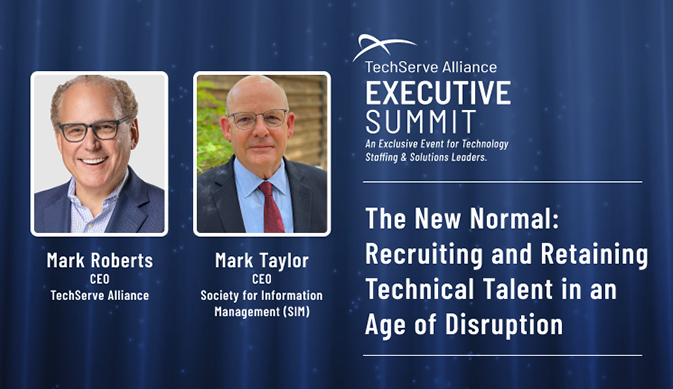
The New Normal
Recruiting and Retaining Technical Talent in an Age of Disruption
Staffing firms in the technology and engineering sectors are operating against a backdrop of unprecedented challenges and change. Mark Roberts, CEO of TechServe Alliance, and Mark Taylor, CEO of the Society for Information Management (SIM) teamed up for a keynote address to outline these challenges and what they mean for the technology staffing and solutions industry. The keynote was delivered during the Tech Talent Forum on the opening day of the TechServe Alliance Executive Summit in Palm Springs, in partnership with SIM.
The short story: the workload is growing, but the workforce is not. The industry is facing an acute supply challenge. There are 800,000 unfilled IT jobs in the United States. IT unemployment sits at just 2.3%, significantly lower than general unemployment. Turnover stands at 8.9%, the highest it has been since 2015.
This is not a short-term phenomenon, and there is no indication of change in the foreseeable future. IT and engineering employment essentially flattened prior to the pandemic slump, and after recovering quickly, it has flattened again. This is not an issue of demand, but rather of supply, and there are no short-term solutions in sight to increase that supply. Colleges are only producing 65,000 computer science grads each year, and for 2022, the H-1B visa program was five times this number, with nearly 484,000 registrations.
The availability of talent is reported as one of the primary issues that keep IT leaders up at night. In response, IT budgets are growing. According to SIM data, 83% of companies have increased their IT budgets year-over-year, particularly in cybersecurity, analytics, and R&D.
Operating in this new normal demands new thinking and new actions. Out of necessity, time to hire has decreased somewhat, but employers still need to streamline their hiring processes, by minimizing ‘friction’ and eliminating any unnecessary steps. There is also a pressing need for companies to tap into new pools of talent by expanding their definition of diversity and providing opportunities for mentorship and upskilling.
Offering flexibility in working arrangements is also critical. There’s no question: remote work is here to stay. A majority of 87% of employees choose remote work when it’s offered, and 60% of those working remotely say they’d change jobs if they were required to return to the office. As a result, 87% of executives are considering changes to their real estate strategies. The world has changed, and the changes continue. Although these changes mean thinking differently about culture, leadership, and employee engagement, the “work anywhere” world also means access to new and broader pools of talent.
Amidst these challenges and opportunities, TechServe Alliance and SIM will continue to collaborate. They will provide members with data-driven insights that will help them understand and succeed in the changing marketplace.
